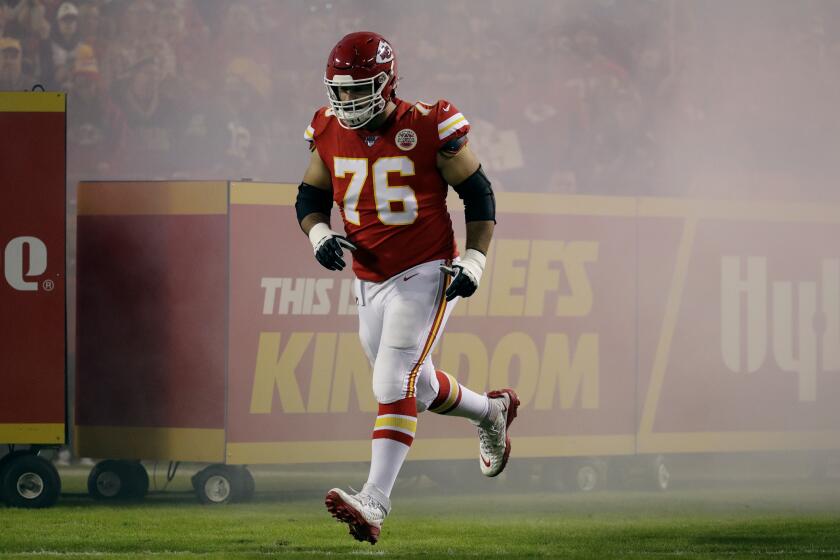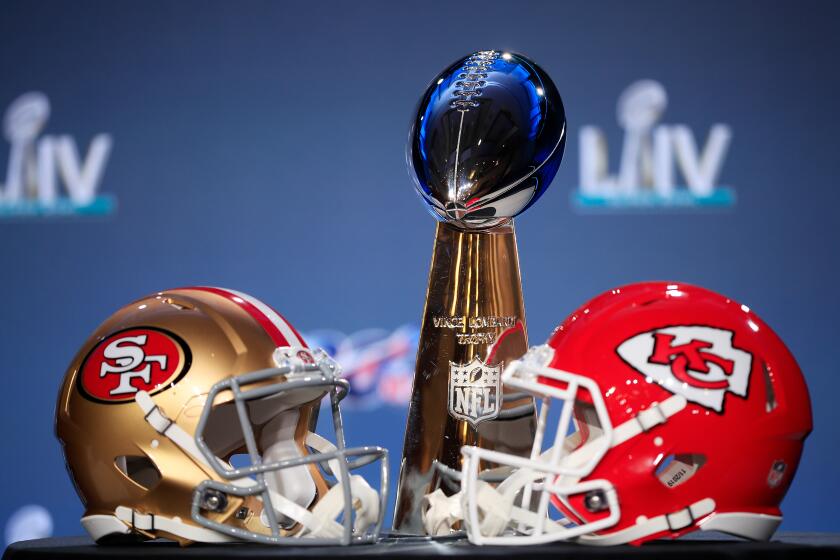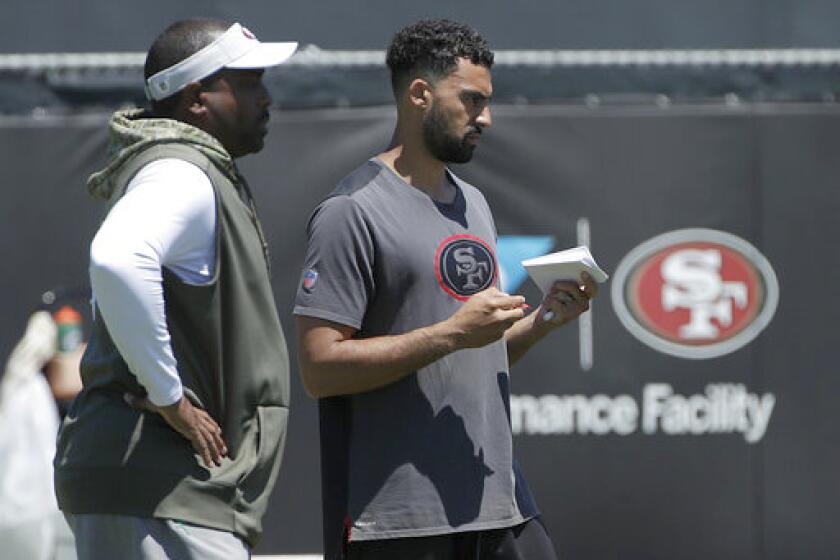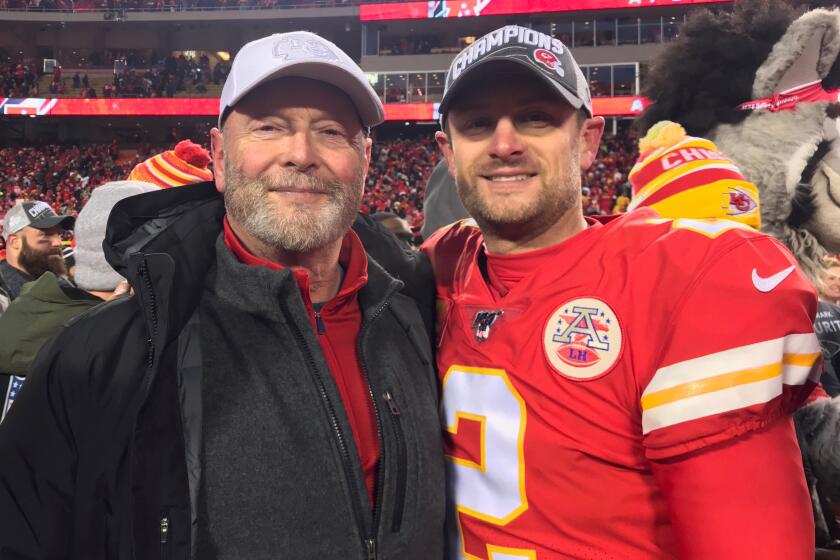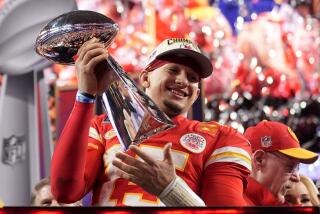Derrick Thomas still chief in minds of Kansas City faithful as Super Bowl approaches
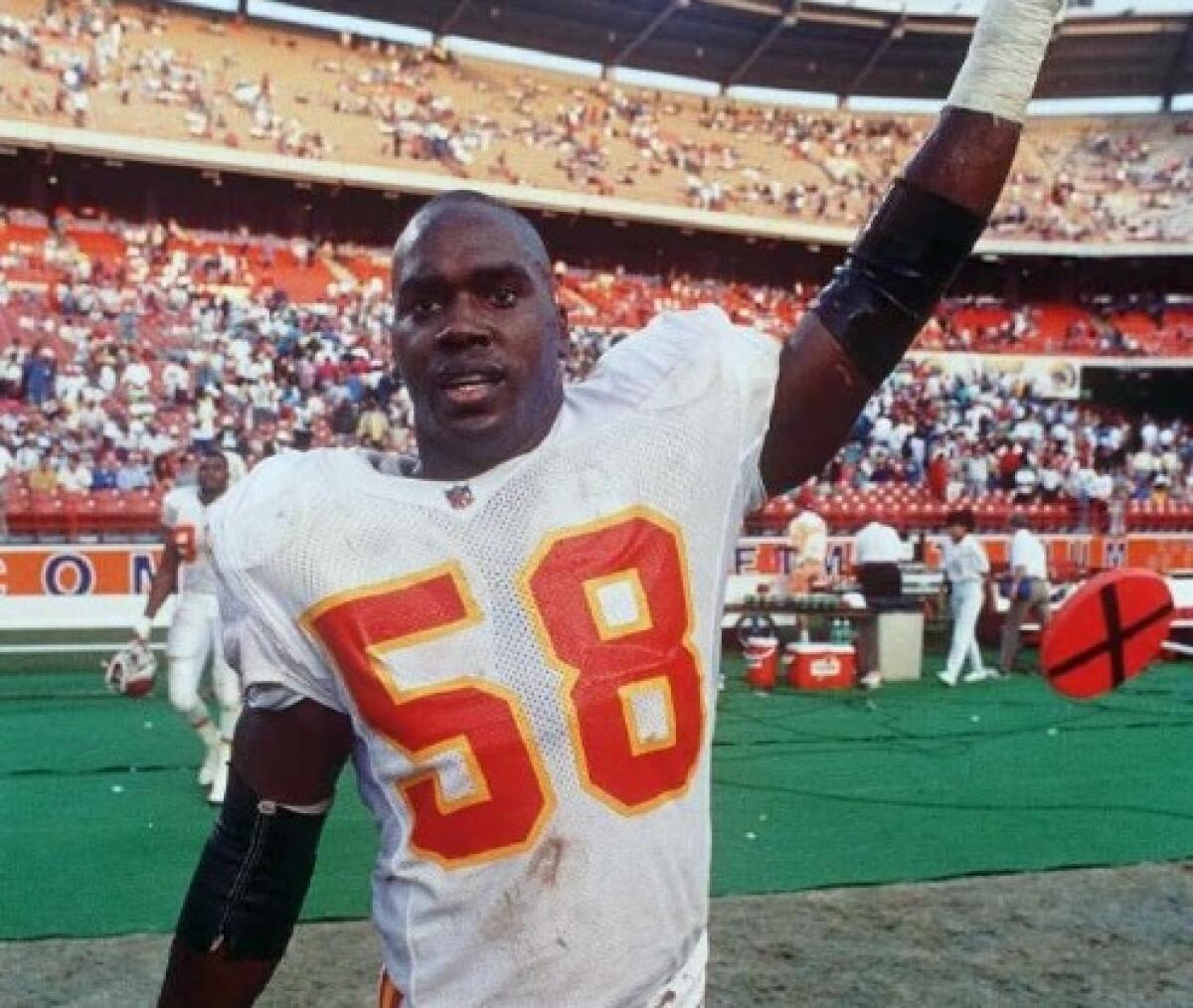
MIAMI — Derrick Thomas, perhaps the greatest defensive player in Kansas City Chiefs history, entered and left his world the same way.
In the arms of his mother.
“The whole thing is still sometimes a blur,” said Edith Morgan, sitting in a downtown restaurant two miles north of Jackson Memorial Hospital, where her son died at 33. “Sometimes you have those moments when it’s like yesterday.”
Next Saturday — six days after Super Bowl LIV — will be the 20th anniversary of Thomas’ death. The All-Pro linebacker, who had been paralyzed from the chest down as the result of a car accident 16 days earlier, suffered from cardiorespiratory arrest while being transferred from his bed to a wheelchair on his way to a therapy session.
“We had gotten him bathed and everything and we were turning him around to put him in the wheelchair and his eyes just rolled back,” Morgan said. “We weren’t anywhere near the call button to call for help. We just had to try to get him in bed and then call for help.
“I had been in the nursing profession for 33 years, and for him to literally die in my arms and there was nothing I could do to save him. That was just ...”
As the Chiefs prepare for their first Super Bowl in 50 years, a showdown Sunday with the San Francisco 49ers at Hard Rock Stadium, Thomas is top of mind for some of his old teammates. He was the heartbeat of those great Kansas City teams that could dominate in the regular season but fall short in the playoffs.
Laurent Duvernay-Tardif, an offensive lineman for the Kansas City Chiefs, is the NFL’s only active player who is also a physician. Now he gets to play in the Super Bowl against the 49ers.
“There’s not a day that goes by where I don’t think of Derrick passing,” said Neil Smith, the bookend pass rusher to Thomas on those Kansas City teams. “I have the ultimate respect for one of the greatest football players I ever played with. Twenty years ago, I buried him. This week, I’m going back to the gravesite. That’s going to mean a lot more to me than this football game.”
Thomas is buried at Dade Memorial South cemetery, about an hour’s drive from his mother’s home north of downtown. Derrick was the eldest of seven children, and doted on his mother, even though he gave her plenty of reasons to worry when he was a kid.
He would go from a juvenile delinquent in frequent trouble with the law to a beloved Chiefs star who with Smith formed the Third and Long Foundation, aimed at helping urban children with challenging backgrounds “succeed in school and in an outside world possessing seemingly insurmountable obstacles.”
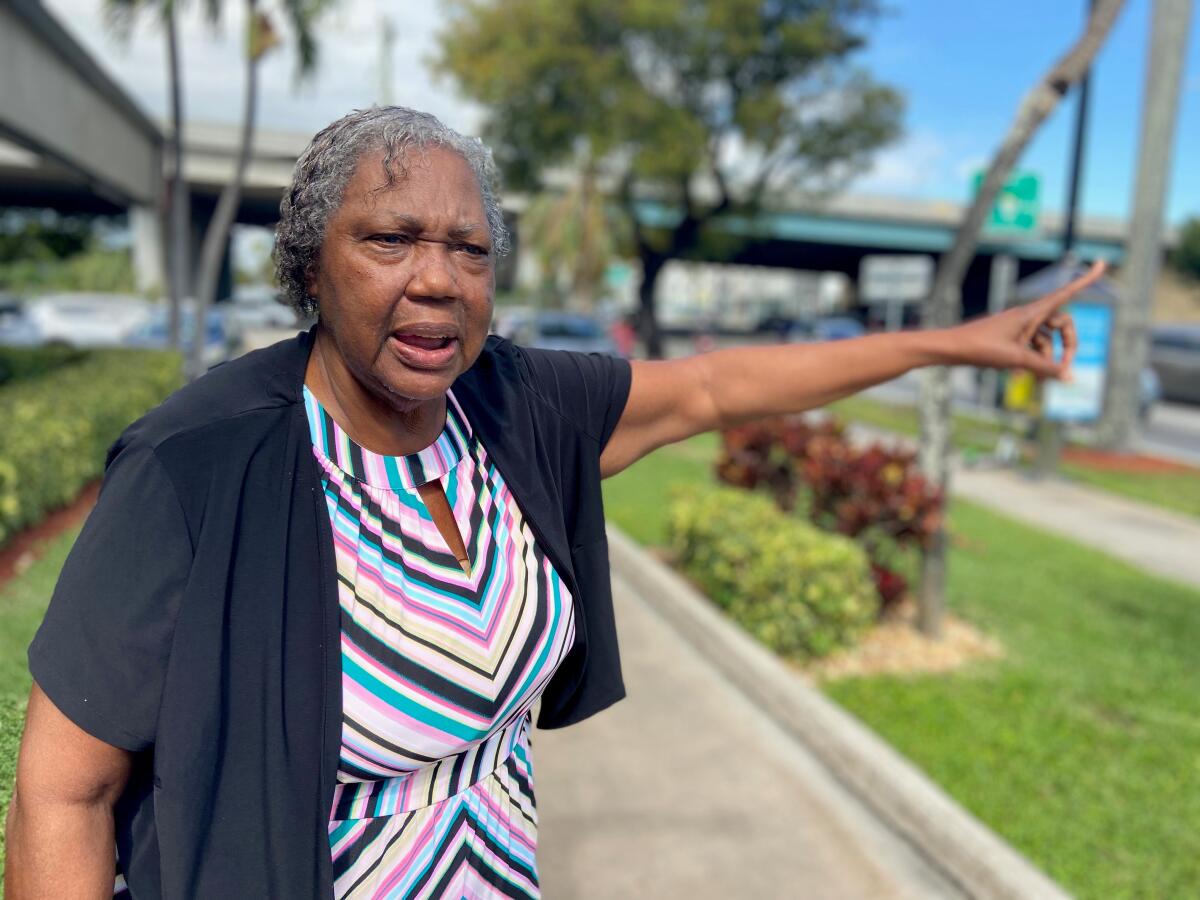
“There were 58 kids in that foundation,” his mother said, the number matching Thomas’ jersey number. “All of them were like his kids. They just loved him to death.”
In 1992, Thomas was named the 832nd Point of Light by President Bush, and a year later was invited to speak at a Memorial Day ceremony at the Vietnam Veterans Memorial in Washington, D.C., where his audience included President Clinton and Gen. Colin Powell.
“He could walk into any restaurant in Kansas City, and they loved it. He’d walk in like he owned the place,” his agent, Leigh Steinberg, recalled of Thomas. “When he walked into a room, discussion would stop. He radiated energy and good fortune. The electricity he had was just different.”
Thomas struck fear in the hearts of opponents. He made nine Pro Bowls in 11 years, finished with double-digit sack totals in seven seasons, and once had seven sacks in a game. Nine years after he died, he was enshrined in the Pro Football Hall of Fame.
Professional gamblers have grabbed all the value in the early Super Bowl lines. Recreational bettors hope this is not a repeat of last year’s game.
“When I came in, he was a god, the man in Kansas City,” teammate and fellow Hall of Famer Tony Gonzalez recalled. “I remember he invited me over to his house, all the young guys, and I saw all these Derrick Thomas posters and little action figures and all this stuff. I was like, ‘Holy smokes, this guy’s the real deal.’ At that point I was like, ‘Maybe I can be like that one day.’ He was such an inspiration.”
For all his dominance on the field, there was a childlike quality to Thomas. When he would come home to visit his mother, he always wanted Oreo cookies and milk, and would watch cartoons. In his own house, he’d keep his Christmas tree up until spring, and set up a model train around it. On Christmas morning, he would get up early to open presents.
“I had a chance to hang out with him quite a bit,” said Gonzalez, now a Fox analyst. “He liked to go out, and I was young and liked to go out. So I’d see him out on the streets all the time. I’d see how he conducted himself.
“He could go from first gear — because he really didn’t practice that hard, I ain’t going to lie — but when game day came, it was like sixth gear. He’d get five, six sacks sometimes. Him coming off the edge, you’d see guys — even guys on our own team. They’d be sitting in offensive meetings when we’re in camp, and you could see the look in their eyes like, ‘Man…’ Especially those young guys, he’d blow right by them.”
That jump from first to sixth gear was classic Thomas. He was either in no hurry at all, or in a mad scramble.
Super Bowl LIV is also Embree Bowl I. Father Jon and son Taylor coach for the 49ers. Son/brother Connor coaches for the Chiefs.
“Whenever he was out for games on the road, he would see how close he could cut it for bed check,” Steinberg said. “If it was like 10 minutes, he’d say, ‘No, no, I’ve still got nine more minutes.’ He’d always rush back from the restaurant and he would make the bed check.”
It was pushing the limits that led to his car accident. He was driving to the Kansas City airport on Jan. 23, 2000, to fly to St. Louis to attend the NFC championship game between the Rams and Tampa Bay Buccaneers. Interstate 435 was icy, and witnesses told police the Chevrolet that Thomas was driving was speeding and weaving through traffic when it struck a median and flipped over several times.
Neither Thomas nor friend Michael Tellis were wearing seat belts. Tellis died at the scene. Thomas sustained a broken spine and neck. Another passenger, who was wearing a seat belt, was treated for minor injuries and released from the hospital soon after the accident.
Once he was stabilized, Thomas returned to Miami to begin his recovery and rehabilitation. Teammates, family and friends rallied around him, scheduling visits to ensure someone was always with him to help out.
He was thrilled when Oakland Raiders owner Al Davis stopped by, his mother said, because Thomas “always wanted to play for the Raiders.” Thomas was remarkably upbeat, and ready to start his new life, despite not having use of his arms or legs.
“It was heartbreaking,” Morgan said. “He would never have wanted to be in that position, because he was always a go-getter. To be in that position was hard for him.”
Dustin Colquitt’s father and brother have Super Bowl rings. In fact, his father has two. The Chiefs punter is hoping he can earn one.
Doctors believe Thomas died from a pulmonary embolus, a blood clot traveling through the lungs. At the time, the chairman of the hospital’s department of neurosurgery called his death “a total shock.”
Said Steinberg: “His death ripped the heart out of a city.”
Even now, two decades later, Morgan hears from people impacted by her son. Some approach her in tears.
“Derrick was always a giver,” she said. “I didn’t know how much he gave until afterward, when people started coming up and saying, ‘He did this. He did that.’ He wasn’t the kind of person to go out and let people know what he was doing.
“It’s was very comforting to me to hear that. I already knew he had a big heart, but his heart was bigger than I even imagined.”
More to Read
Go beyond the scoreboard
Get the latest on L.A.'s teams in the daily Sports Report newsletter.
You may occasionally receive promotional content from the Los Angeles Times.

